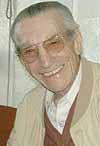| John B. Grako |
World War II began in earnest for the United States with the bombing of Pearl Harbor in Hawaii in 1941. There were many theatres of war and one of the places where America struck back first was in North Africa where the Germans, along with their Italian allies, were trying to drive out the British and free French.
A Carbon County native, John B. Grako, was born in Sunnyside. The 85 year old still lives and works in the county. He was born in 1917 and lived in Price with his grandmother in those early years.
He graduated from Scottfield, Ill. in radio operations and completed his basic training at Shepherd Field in Texas. While he was in Texas he became sick from the wind blowing red dust from the Red River Valley and was hospitalized with nasal problems.
Trying to get away from the Texas problem he applied for a radio operator and mechanic position and was sent to an Army Air Base Radar School in Orlando, Fla.
Once he completed this school he was ready for overseas and at Norfolk, Va. he boarded the ship Florence Nightingale for the trip. This was the first big gathering of ships that were bound for Europe. In September of 1942 it was the beginning of the invasion into Northern Africa.
His ship landed in Port Lyautuy, which was part of French Moroco, which is only about 100 miles from Casa Blanca. They landed around Nov. 8, which was close to Veteran’s Day, almost 11 months after the attack on Pearl Harbor. He served his entire three and a half years in the war as a radio operator and mechanic. From French Morocco his troupe crossed Northern Africa heading east and also served in Southern Europe.
| United States troops cleaning up their mess kits while stationed in North Africa. Depending on where a service man was stationed and what he was doing, the conditions they lived under were quite different from one another. |
Towards the very end of the war while his unit was stationed in Po Valley, Italy, Grako remembers over hearing an air force pilot as he listened to his radio. The pilot was about 20 miles from Milan, Italy, and was observing the German soldiers pulling their equipment with horses.
“They were out of fuel and out of oil and the pilot said, this war is basically over,” says Grako.
He served in the 425 Army Air Force Base Unit and was awarded a medal as a marksman. The battles and campaigns his unit engaged in included Algeria, Tunisia, French Morocco, Rome, Italy; Southern France, Naples, Foggia, North Apennines, and Po Valley.
All toll he was in the service three years and six months but was overseas involved in the World War II efforts for about three years.
He was awarded medals for good conduct as well as decorations for serving in the European, African, and Middle Eastern Service.
Once he returned to America, Grako thought he would get to go home, but instead he was sent to Mountain Home, Idaho, where he served until the war was officially over in August of 1945.
Then he was able to return to Utah and eventually buying his first car, a four-door convertible.

